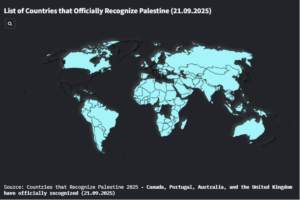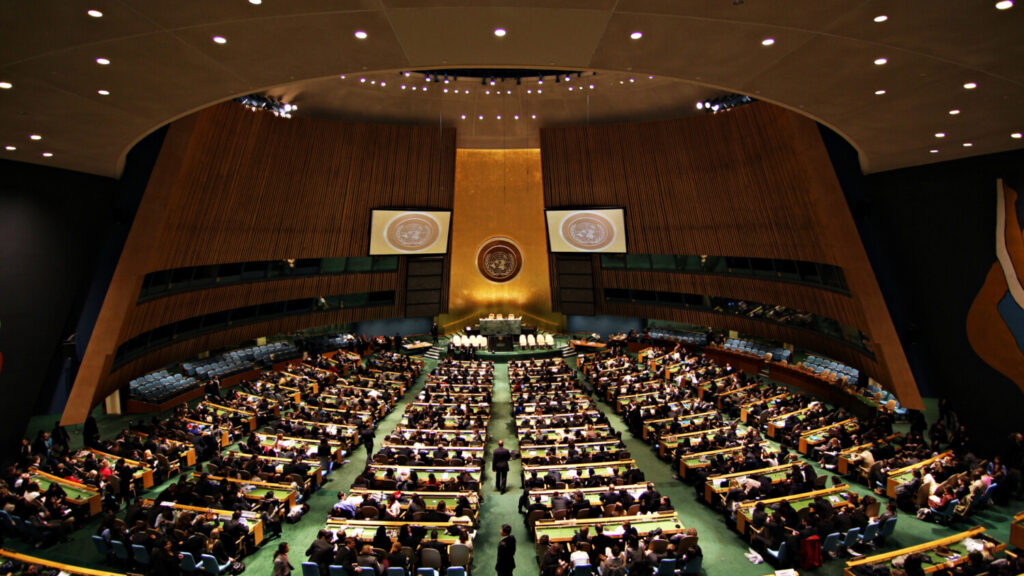A Critical Step Forward in the Middle East
The Present Situation in the Israeli-Palestinian Conflict
The Israeli-Palestinian conflict has been a major focus of international political activity for many years. However, recent actions by Western countries to recognise the State of Palestine represent a noteworthy advance in diplomatic efforts. The decisions made by the United Kingdom, Canada, Australia and Portugal have served to reinvigorate debates on the two-state resolution, while simultaneously underscoring the political incompatibilities between Israel and its Western allies. Although these measures have a limited direct impact on resolving conflicts on the ground, they have the potential to significantly affect diplomatic legitimacy, international public opinion, and the regional balance of power.
The recognition of Palestine by these states has been closely observed in the context of international relations, with its significance regarded as a notable shift in diplomatic dynamics. This step represents a significant shift in the Western world’s approach to the Israeli-Palestinian issue, underscoring diplomatic support for the two-state solution (Hendrix, 2025). It is also reflective of a growing sense of unease among Western societies regarding the ongoing humanitarian crisis in Gaza and the settlement policies in the West Bank. In the case of the UK, both government considerations and public pressures were decisive, while Israel reacted harshly, describing the move as a “reward for terrorism” (Wintour, 2025).
Recognition Motives and Western Diplomacy
The recognition initiatives have catalysed a broadening diplomatic wave, with countries such as Portugal, Belgium, France, Luxembourg, and Malta emphasising that a two-state solution remains the only viable path. Yet, the potential annexation of the West Bank by Israel and the subsequent economic responses of the European Union suggest that recognition could also engender new tensions rather than revitalising the peace process in the immediate term. The persistence of the US veto and policy incompatibilities between Israel and the Western alliance illustrate the structural limits of coordination (Mohamed, 2025).
The United Kingdom’s decision sought to acknowledge Palestine within its 1967 borders and to establish full diplomatic relations in the future, citing historical responsibilities and efforts towards a two-state resolution (Wintour, Crerar, & Walker, 2025). Israel’s severe measures and its cautionary statements concerning potential regional instability highlight the limited consequences on the ground. Nevertheless, recognition continues to serve as a diplomatic symbol that strengthens Palestinian legitimacy in the international community, even as its realistic capacity to advance the peace process is undermined by Israeli resistance and the US veto (Pylas, 2025).
Regional Reactions and Geopolitical Risks
The recognition steps carry implications for the wider Middle East. Israeli military operations and settlement expansion remain central obstacles to the two-state solution, while the existence of armed groups such as Hamas perpetuates ongoing security risks. A robust reaction from Israel and the United States could create discord within the Western alliance, weakening coordination in economic and military collaboration. At the same time, pro-Palestinian sentiment has grown within global public opinion, even if the reality on the ground has remained largely unchanged.
Regional actors such as Saudi Arabia, the UAE, and Egypt may leverage these Western decisions to advance the peace process. Yet such manoeuvres could simultaneously jeopardise the normalisation processes with Israel and increase uncertainty within international institutions and UN mechanisms. These developments underscore the emergence of multi-layered political risks, including the possibility of economic sanctions, intensified military tensions, and public pressures that may hinder conflict resolution efforts (Demony and Acharya, 2025).
Implications for Palestinian Governance and Civil Society
While international recognition strengthens Palestine’s diplomatic legitimacy, its domestic impact on governance and society should not be overlooked. For the Palestinian Authority, recognition provides a degree of external validation that may enhance its negotiating position. However, without improvements in governance effectiveness, internal unity, and reconciliation with rival factions such as Hamas, the benefits are likely to remain limited.
For Palestinian civil society, recognition is an important symbolic victory that validates long-standing demands. Yet the absence of tangible improvements in mobility, economic opportunity, and personal security weakens its transformative potential. In practice, this means that recognition operates as a diplomatic tool with restricted ability to produce immediate change for ordinary Palestinians, underlining the gap between symbolic effect and material impact.

Long-Term Outlook
Consequently, while recognition initiatives remain constrained in their short-term capacity to transform realities on the ground, they hold substantial potential to reshape regional balances of power, diplomatic relations, and the risks associated with the Israeli-Palestinian conflict in the long term. The symbolic dimension is undeniable, yet it must be combined with diplomatic pressure, humanitarian assistance, and coordinated sanctions if concrete changes are to be achieved.
The recognition of Palestine by the United Kingdom, Canada, Australia, and Portugal marks a turning point in Western diplomacy, amplifying Palestine’s legitimacy within the international community and redefining the diplomatic framework of the conflict. At the same time, Israeli settlement expansion, the role of Hamas, and the United States’ veto continue to constrain its capacity to alter realities on the ground.
In this sense, recognition is both a sign of shifting global opinion and a reminder of the limits of symbolic politics. Its long-term value depends on whether it is integrated with sustained diplomatic strategies, crisis management, humanitarian aid, and internal reforms within Palestinian governance. Only under such conditions can recognition evolve from symbolic gesture into a catalyst for regional stability and long-term peace; otherwise, it risks remaining an emblematic act of solidarity without tangible outcomes.
Bibliography
- Demony, C. Acharya, B., 2025. Four major Western nations recognise Palestinian state, to fury of Israel. Reuters, 21 September. Available at: https://www.reuters.com/world/americas/britain-australia-canada-recognise-palestinian-state-2025-09-21/
- Hendrix, S., 2025. U.K., Canada, Australia recognize Palestine as a state, breaking with U.S. The Washington Post, 21 September. Available at: https://www.washingtonpost.com/world/2025/09/21/britain-recognizes-palestine-state-israel/
- Mohamed, E., 2025. Canada, Australia join UK in recognising Palestinian statehood. Al Jazeera, 21 September. Available at: https://www.aljazeera.com/news/2025/9/21/canada-australia-join-uk-in-recognising-palestinian-statehood
- Pylas, P., 2025. UK, Australia and Canada recognize a Palestinian state, prompting anger from Israel. AP News, 21 September. Available at: https://apnews.com/article/britain-palestine-recognition-israel-starmer-f667dca304a308b4b3ccf8100ef5051e
- Wintour, P., 2025. UK, Canada and Australia announce formal recognition of Palestine, with wave of Israel’s allies to follow. The Guardian, 21 September. Available at: https://www.theguardian.com/world/2025/sep/21/uk-canada-and-australia-announce-formal-recognition-of-palestine-with-wave-of-israel-allies-to-follow
- Wintour, P., Crerar, P. Walker, P., 2025. UK recognises state of Palestine to ‘keep alive’ the possibility of peace. The Guardian, 21 September. Available at: https://www.theguardian.com/uk-news/2025/sep/21/uk-recognises-palestine-as-an-independent-state



